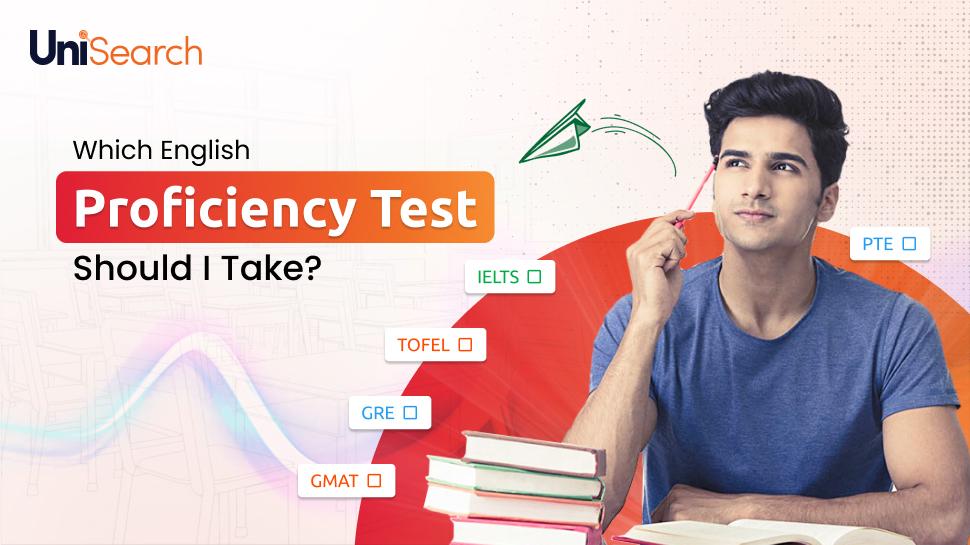
There’s one thing almost all the major study abroad destinations have in common. And that’s the most commonly spoken language. English isn’t just the most widely spoken language in the world. It’s also likely the language in which the programs you’re aiming for are taught. And this means that your universities want to know how good you are with the language. They’re not the only ones either! Most immigration offices also look into your English proficiency level as part of your visa application. Your ability to understand, speak, write, and read English reflects how well you’ll do in an academic or everyday setting abroad. Not being able to satisfy universities and immigration officers on this note might be what sets your study abroad efforts back. So, we know that the English proficiency test is an important aspect of your study abroad efforts. But which English proficiency test should you take?
The Most Widely-Recognised English Proficiency Test Options
While universities might accept multiple tests as proof of your English ability, we’re going to cover the three most popular ones. The IELTS, TOEFL, ELTT and PTE Academic are all tests accepted by universities and institutions worldwide!
Which Test Scores Does Your University and Study Abroad Destination Accept?
To figure out which test is the right one for you, the primary question is - what is your university accepting? University websites usually dedicate a section to their English language requirements for international students. These requirements might be program-specific, so make sure you’re keeping an eye out for that! Target score requirements might specify overall score requirements for each exam as well as minimum scores for each section. Meanwhile, your study abroad destination might also have specific score requirements as part of your visa process. If you can kill two birds with one stone by sitting the same test for both, all the better! All three exams - the IELTS, TOEFL, and PTE Academic - evaluate similar aspects of your English language ability.
Let’s take a look at how the tests compare!
| IELTS Academic | TOEFL | PTE Academic | |
| Sections |
|
|
|
| Duration | 2 hours 45 minutes |
| 2 hours |
| Exam Delivery |
|
| Computer-delivered |
| Test Location |
|
|
|
| Score Breakdown |
| TOEFL iBT - Overall score: Between 0-120 - Section scores: 0-30 TOEFL Essentials - Overall score: Between 0-12 - Section scores: 0-12 |
|
| Recognised By |
|
|
|
How Can I Choose the Right Test for Me?
Let’s say that your chosen universities and study abroad countries accept all three of these tests. But which one should you go for? Here’s our round-up of factors to consider when booking your English proficiency test.
Accessibility
This is a big one since, after all, you’re going to need to sit the test to get the scores. Let’s see how each test fares on the accessibility front.
TOEFL
The TOEFL iBT scores multiple points on this front for being consistently very accessible. You can sit for this internet-based test both at a test centre and at home! This is great news if you don’t have a test centre nearby. You have the option to sit for the TOEFL iBT in one of three ways:
- TOEFL iBT - you sit the test via computer, at an authorised TOEFL test centre
- Home Edition - you can sit the test via a computer in your home, under the supervision of a proctor
- Paper Edition - you take a written, paper-based test for the Reading, Listening, and Writing sections at an authorised TOEFL centre. The Speaking portion takes place at home!
The content and score breakdowns of these tests are the same. The only difference is how you sit for them. If you take the test at a centre, you do the whole thing in one sitting. And if you opt for the Home Edition, you similarly do the full thing on a computer at home, while supervised by a proctor.
A revised Paper Edition of the TOEFL iBT is also available, though only in specific locations. Currently, Colombia, India, Mexico, and the USA are the only countries holding the paper-based edition of the test. If you do get to sit for the Paper Edition, you’ll be doing the Reading, Speaking, and Listening sections at the test centre. And the Speaking section takes place through a computer in your home! Take a look at our thorough breakdown of the TOEFL tests to find out more.
IELTS
The IELTS has over 1,600 test centres in over 140 countries. And like the TOEFL, it also offers the option of taking either the computer-delivered or paper-based test. Which test is accessible depends on which test centre you book your test in. When you sign up to register for the IELTS, you’ll be able to check whether the centres closest to you administer the computer-delivered or paper-based option.
The most popular option for sitting the IELTS is at a designated test centre. However, there’s good news! Starting in 2022, the IELTS Online version is also available for test-takers at home. The content, scoring, and prep material for the online edition are the same as the IELTS Academic test you’d sit at a centre. Thanks to this upgrade, the already popular IELTS has become even more accessible.
One thing you do need to keep in mind when booking an IELTS test - you take it in two sittings. The Reading, Listening, and Writing sessions happen back-to-back in one sitting. The Speaking session happens separately, with an interviewer either in person or online. Both sessions might happen on the same day or on different days. Find out more about the format and content of the IELTS Academic in our step-by-step guide!
PTE Academic
Unlike the IELTS and TOEFL, PTE Academic is exclusively a computer-based test. If this is the test you opt for, you will sit for it in on a computer, in a secure location. Compared to the IELTS and TOEFL, there are fewer test centres available - over 300 centres around the world offer this test. Nonetheless, this test does have an online option for those who don’t have access to a centre closeby. We do need to highlight, though, that the PTE Academic Online test isn’t valid for visa applications.
While this means that the PTE Academic test is marginally less accessible compared to the IELTS and TOEFL, it’s still an English proficiency test with global recognition. If you’re aiming to study in Australia, New Zealand, or Ireland, PTE Academic scores meeting target requirements do the trick! Take a look at our thorough breakdown of the PTE Academic exam format.
Difficulty Level
Now, this is a harder question to answer. Which sections or test components are difficult is subjective and depends on the person taking the test. A good way of gauging which test you might do better in is by trying out sample tests for the IELTS, TOEFL, and PTE Academic. Each test provider offers both sample tests as well as paid preparation kits to give you a taste of the exams before you sit them. Plus, you can find plenty of helpful and free resources elsewhere too! Trying out English proficiency test questions and answers, then comparing how they measure up against target score bands of your university and study abroad destination, gives you a good idea of which test might be easier for you to score in.
Scoring Accuracy
Both the IELTS and TOEFL exams are partially graded by AI and partially by certified examiners. The Reading and Listening sections for the IELTS go through computer grading. Examiners, on the other hand, evaluate the Writing and Speaking sections. This helps avoid issues like the computer failing to pick up handwriting quirks, stylistic writing choices, or mishearing words. The same is the case for the computer-based TOEFL iBT test. Comparatively, the PTE Academic test is scored digitally. Pearson, the test provider, believes this eliminates human bias and error from the grading process. Each test has its own failsafe in place to make sure your scores are as accurate and fair as possible. They also have their own sets of mechanisms to rescore your test if you feel there are any inconsistencies in your grades.
Retakes and Validity
There’s no limit to how many times you can take the IELTS, TOEFL, or PTE Academic. For each exam, your test scores are valid for up to two years from the test date. This is good news if you find that you don’t quite meet the score boundaries you need to during your first session. For the TOEFL iBT, you have to wait three days after each session before you can sit for a new one. A plus of the TOEFL, though, is the MyBest Scores option. If you need to hit specific score boundaries for the four different sections, you can choose your best scores from different test sittings to present your best score combinations!
Getting Your Results
To plan your applications and arrange for potential retakes, you need to know how quickly you get your results. Here’s how long it takes to get your scores depending on which test you take!
IELTS
- Computer-Delivered: 3-5 days
- Paper-Based: 13 days
TOEFL
- TOEFL iBT (at the test centre): up to 6 days
- Paper Edition: 6-10 days
- Home Edition: 11-13 days
- TOEFL Essentials: up to 6 days
PTE Academic
2-5 days
Our Concluding Thoughts: Which English Proficiency Test Should You Take?
For starters, which test scores are your chosen universities and study abroad destinations accepting? It’s best to look into the score requirements of both your university and the visa application. This way, you just sit the same test both will accept and hit the target score bands for each! Since sitting any of these tests can be a bit pricey, you can save yourself some expensive retakes too. As for all the factors that determine the right English proficiency test for you, we hope this overview gives you a good idea of the right fit! Do be sure to check out our complete guides on the IELTS, TOEFL, and PTE Academic to get a thorough understanding of how each test works.
Frequently Asked Questions (FAQs)
Which English proficiency test is easiest?
This is quite subjective and the answers can vary a lot for different people. To figure out which test you have an easier time scoring in, we recommend trying out practice questions from each of the tests! These often come with score guides and other resources to help you figure out how you’d do in the real thing.
Which is better, IELTS or PTE?
“Better” is a matter of option as well as a matter of preference. “Should I take the IELTS or PTE?” boils down to your circumstances and preferences. Do you want to sit the full thing in one sitting? Then a PTE Academic test would be better for you. Do you think you’ll get a better evaluation if your Writing and Speaking sections go through a person rather than a computer? Then the IELTS might be better for you. It’s best to consider all the options available to you before making your decision. The IELTS, TOEFL, and PTE Academic exams each have their own distinct formats and structures. What works best for you does, in the end, depend on you!
